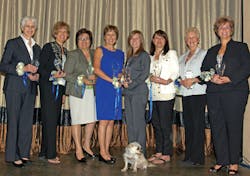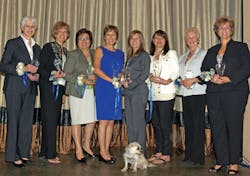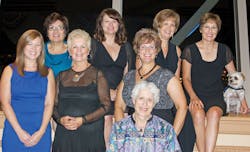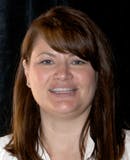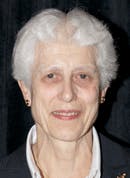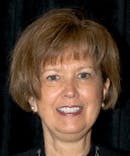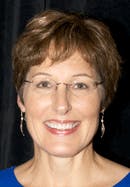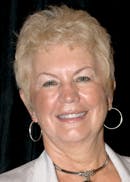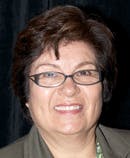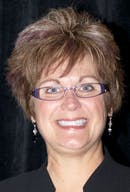2012 Sunstar/RDH Award of Distinction
By JACKIE SANDERS, RDH, BS, AND MARK HARTLEY
Sunstar Americas, RDH Magazine Proudly Present the Award Recipients
Passion has been defined as a strong liking or enthusiasm for a subject or activity. Once an individual finds the emotion connected to this definition, his or her achievements may rise above the norm. The Sunstar/RDH Award of Distinction originated 11 years ago to recognize the individual achievements of dental hygienists who found their inner drive and rose above expectations — an award to honor individuals who have defined their passion and developed the success of their dreams through hard work and desire.
On August 2, 2012, Sunstar Americas and RDH magazine honored eight dental hygienists at the RDH Under One Roof conference in Las Vegas. Each recipient was recognized for her achievements and introduced to her peers. These proud women joined a prestigious group of 81 past award recipients who are a reflection of what can be achieved in dental hygiene when one chooses to elevate his or her career.
Experience, passion, and dedication are elements required to become a Sunstar/RDH Award of Distinction member. The 2012 recipients were chosen with much respect for their achievements. Their accomplishments are reflected in the individuals whose lives they have changed for the better. This year’s recipients have provided a better quality of life for:
- Less fortunate children
- Individuals with life-altering disabilities
- Residents in long-term care facilities
- Individuals dealing with mental health challenges
They have also been involved with:
- The development of a Medicaid clinic for patients without access to care
- Volunteer programs for senior citizens that aid organizations seeking volunteer assistance
The 2012 Award of Distinction recipients each reflect these key elements, and the biographies below give readers a glimpse into the hearts of dental hygienists who have found their personal callings in the profession. A quote from Rabindranath Tagore says it best: “I was dreaming and thinking that life was happiness; I woke up and saw that life was service. I served and understood that service was happiness.”
Terri Chandler, RDH Las Vegas, Nevada
Chandler’s nonprofit organization, Future Smiles, provides school-based care to 2,400 childrenChandler noted, “All at-risk children enrolled at the schools are eligible for our services. Participation rates have increased dramatically, and we are currently serving an average of 200 children monthly through our various school and community sites. Community impact is achieved through oral health education and ‘brush at lunch’ events at parent meetings, health fairs, and community sites.”
As the founder and executive director of Future Smiles, Chandler carefully tracks the success rates of the program, which saw the treatment of 2,116 at-risk children in 2011 (69% were uninsured). Thirty percent had untreated tooth decay, and 13% of the students had emergency dental needs due to pain. She reports that most families had a monthly income of under $1,400 and parents did not graduate from high school.
Since Future Smiles’ started in 2009 at Cunningham Elementary School, Chandler reports a 45% increase of children with dental sealants and an 18% decrease in children with untreated tooth decay. Overall, 8,980 dental sealants have been placed, as well as 3,800 applications of fluoride varnish.
“The ah-ha moment for me was when our original site, Cunningham Elementary School, revealed that 15% of the children had a dental sealant at baseline in 2010; now in 2012 that same school measures 60% dental sealants,” Chandler said. “Imagine how healthy the service population will be in five years with 60% or more of the students benefiting from dental sealants and decreased tooth decay! Prevention works; it saves money and averts the incidence of oral disease!”
Chandler credits Stephanie Redwine, RDH, BS, the dental hygiene director for Future smiles, and Joanne Cummings, the program resource coordinator, for managing the day-to-day operations and scheduling of the program.
“Much of my time is spent analyzing data to incorporate into reports and grant opportunities,” she said. We share our successes with our partners and supporters. My greatest challenge is to secure continuation of funding through grant writing and in-kind donations.
“Every bit helps, and we are so grateful to advocacy organizations such as Oral Health America (OHA). The hard work and long hours are really worth it because there are more than 2,400 at-risk children who are depending on Future Smiles to provide their school-based oral health care.”
She is far from being content with the growth of Future Smiles, and anticipates the program addressing the needs of all at-risk students in Clark County schools.
Chandler said, “The dream would be to have a dental hygiene-based program supporting all at-risk schools, just like a school nurse who provides basic health services at multiple schools. Additionally, I’d like to see more dental hygienists apply for a National Provider Identification (NPI) number and become credentialed Medicaid providers. All 10 of the Future Smiles public health dental hygienists are credentialed Medicaid providers, and the program does bill Medicaid under the public health dental hygienists.
“The reality is that dental hygienists can foster an increase in the family unit’s dental literacy with the long-term goal of establishing an information exchange, transforming each family’s health status to a new level of positive behaviors and lifelong independent health. Studies show that children who are in poor oral health are three times more likely to miss more school due to oral health related illnesses and, subsequently, perform more poorly in school. It is the goal of Future Smiles to decrease the incidence of inherited poverty by breaking the cycle of children’s poor oral health and struggles within educational performance.”
Chandler is a 1999 dental hygiene graduate of the College of Southern Nevada in Las Vegas.
Patricia Doyle, RDH, BS, FADPD Seattle, Washington
Doyle was nominated for the Award of Distinction by Norma Dow Eide, RDH, who is based inIn her nomination, Eide observed, “Years ago, Patty was fortunate to volunteer with a mental health day treatment group and enroll in the University of Washington’s Dental Education in Care of Persons with Disabilities (DECOD program), where she emphasized training in the psychiatric patient and dental care. Since then, her passion and life’s contribution to her profession have been in recognizing the impact mental illness can have on patients’ oral health, their ability to receive dental care, and in teaching how these difficulties can be overcome.”
Some 31 years later, Doyle remembers her introduction to volunteering.
“This social worker was a pro, very astute,” she recalls. “She saw a hygienist who had some free time, a hospital dental clinic across the street, and a group of clients with many dental needs. This was the beginning of an amazing journey.”
In addition to completing the university’s DECOD program, Doyle obtained other certificates in progams focusing on the needs of individuals with severe, chronic mental illness. As affiliate faculty at the university, she worked on a pilot study investigating dental needs of persons with chronic mental illness, as well as other DECOD educational efforts over many years.
Doyle left Harborview Medical Center in 2010, where she served as a volunteer providing screenings, education, referrals, and dental care for the Seattle hospital’s Mental Health Services Program. This work led to collaboration with her brother, a dentist in private practice, with whom she still works. Together, the two dental professionals have provided years of oral health care for people with chronic mental illnesses.
“In the beginning I had limited knowledge about psychiatric diagnoses and the gamut of conditions one can encounter,” she says. “My eyes were opened to the severe illnesses, the poverty, the lack of family, friends, and community support, some homelessness, and the immense need for oral health care.
“Patients like those I saw at Harborview represent only 2 to 3% of mental illness — the rest of the mental illness pie is the rest of us. The National Institute of Mental Health reports the lifetime prevalence of a mental disorder (including substance abuse) is one in three adults.
“This being said, I realized the importance of a whole person approach in dentistry, no matter the setting, and that mental illness often lurks beneath the surface. The majority of my work life, 34 years, has been in private practice with my brother. Today, there is much talk about the oral-systemic connection — let’s not forget about the mental.”
Doyle said there was no typical day when treating the needs of patients with severe and chronic mental illness. But she did list items she “reflects on” about her years at Harborview:
- “I learned the value of flexibility and thinking on your feet, because in this milieu, change is a constant.”
- “Most notably, I developed a new skill — dental case management. This wasn’t a choice; it was a necessity.”
- “I saw the need for education of both clients and case managers on the importance of dental health to mental health.”
- “Life at Harborview allowed me to step out of my dental role and assist with client outings. This was valuable for clients in allaying their fear and anxiety in the dental setting.”
- “Securing donated items for clients brought holiday cheer and warmth to many. I created a holiday gift project that grew to gifts for 600. For some it was their only gift.”
- “Time and time again, it was a marvel to see how resilient people are and how much inner strength they possess in the face of sometimes overwhelming adversity.”
- “To listen with your heart, with compassion and empathy, you see the person, not the disease.”
- “I learned the value of helping one person at a time, and I was energized by the successes we enjoyed.”
Doyle is a 1965 dental hygiene graduate from the University of Washington.
Carla Gantz, RDH Glasgow, Kentucky
Gantz was nominated for the award by Nancy Brohawn, RDH, who is based in Delaware. Carla is aShe started her career in dentistry as a dental assistant, and it was here where she found her passion for her profession and the love of interacting with patients. With this drive, Carla returned to college as a nontraditional student to continue her education and become a dental hygienist. She would graduate with the “Outstanding Student Award” and the Congeniality Award, confirming her decision to provide oral care to others.
As a clinical dental hygienist, she still found time to be an active member of the Kentucky Dental Hygienists’ Association where she held the office of president, speaker of the house, and first and second vice president. In addition to this already busy schedule, Carla worked as a consultant, speaker, and author. One of her proudest achievements was when she was invited to the international Xlear xylitol conference in Cancun, Mexico, where she was awarded the opportunity to present her case study results on the benefits of xylitol products with her patients and their oral health.
In 2006, Carla was diagnosed with Parkinson’s disease. Being presented with this challenge, as Carla does, she moved forward aggressively. As her clinical treatment days slowed down, she took her prior knowledge from her consulting experience and became a treatment coordinator and office manager. Her years of dental experience were coming full circle and moving her career forward down a new and exciting path.
While learning more about her personal health, she developed a program for the dental professional titled, “The Movers and Shakers in Your Chair” — a course that teaches the dental hygienist how to treat individuals dealing with Parkinson’s disease. The development of this program would provide Carla with the opportunity to once again benefit those patients in need of her assistance.
She continues to attend educational courses and learn about new techniques and products, especially those products that can enhance the life of the person with Parkinson’s disease. She then shares this information with patients and other dental professionals. Gantz admits that she will forever miss her former days as a clinical dental hygienist, but she knows she is still benefiting patients by educating her professional peers. Her course helps dental professionals understand the implications of Parkinson’s in the dental setting, including teaching others how to spot the early warning signs before the disease is medically diagnosed. You can learn more from Carla by visiting her Facebook page. She invites all hygienists to join her Facebook link, Parkinson’s disease and dental hygiene: From the mouth of a mover and shaker. Her goal is to be the oral health resource for caregivers and people with Parkinson’s.
In her spare time, Carla is a volunteer speaker for the local Parkinson’s support groups. She provides information on oral health and the connection to the systemic health while connecting through a personal shared experience.
Gantz is a 1996 dental hygiene graduate from Western Kentucky University.
Jessica Huffman, RDH, MDH Charlotte, North Carolina
Huffman’s dedication to volunteerism focuses on two aspects — the underserved and professional“Over the past 10 years, I have been very dedicated and eager to cater to the needs of those in the community with limited access to care,” she said. “I have devoted many days and hours volunteering.”
In addition to volunteering in traditional settings, such as school presentations during National Children’s Dental Health Month, Give Kids A Smile activities, and the Esther Wilkins International Education program (administered through the National Children’s Oral Health Foundation), she also educates expectant mothers on oral health care and provides dental screenings to low income residents in a church-related charity.
Florence Crittenton Services is a nonprofit organization that helps pregnant and at-risk girls and women by providing medical and prenatal care.
“Our mission is to educate expectant mothers about oral health care for themselves during pregnancy and proper oral health care for babies’ mouths once they are born,” Huffman said. “Adolescents as young as 10 years old take part in this program. Each participant leaves the program with an oral health education kit and items to use for homecare for themselves and their infants. Being able to make even a small impact in these individuals’ lives makes the time and effort put into this program all worth it. Often, the participants will return to the program to show off their brand new babies.”
She also participated in a Give Kids A Smile program hosted at a NASCAR event at the Charlotte Motor Speedway.
“At this event, the children received radiographs, dental sealants, fluoride varnish, and a session on oral health education was presented,” she said. “I loved seeing all of the kids, holding their hands, helping them overcome their fear, receiving their hugs, and hearing them say thank you at the end. This is what inspires me to continually volunteer!”
She made the decision to become involved with her professional associations very early in her career and is the current president of the North Carolina Dental Hygiene Association. She frequently visits dental hygiene schools and meetings to encourage a greater level of involvement within the profession.
Huffman said, “I have taken a great interest in engaging the younger generation in their professional association and providing them with invaluable mentoring that will ensure that this profession continues to grow and prosper. Dental hygiene students and new graduates hold the future of dental hygiene in their hands; therefore, it is essential that they receive the proper mentoring that will guide them to advance this profession.”
She graduated with a bachelor’s degree in dental hygiene from West Liberty University in West Virginia in 2004 and earned a master’s degree in dental hygiene from the University of Tennessee in 2011. She works in the practice of Dr. Kathryn Savitsky in Charlotte, and the two have developed an aggressive stance for oral cancer screenings. Both perform intra- and extraoral exams for each patient.
“We determined that it never hurts to have two sets of eyes checking,” she said. “Over the past year, I have detected a multitude of lesions during the intraoral exam. Three of these lesions were diagnosed as oral cancer in early stages. Two victims were women in their thirties with young children. It is scary as a dental professional to discover these lesions, but even more scary to be the patient receiving the news.”
Sandra Maurizio, RDH, PhD Carterville, Illinois
Maurizio was nominated for the award by Sherri Lukes, a colleague at Southern Illinois University inThe majority of her work has been with local health departments and state associations, serving on panels, sharing curricula and presenting data for the greater good. It is all on a volunteer basis as part of her position at SIUC, but most of all because of her passion for the oral cancer patient.
Maurizio said her efforts focused on bringing the entire health-care community together in screening for oral cancer.
“Access to care is a major issue in preventing and detecting oral cancer in the earliest stages,” she said. “We need to educate medical providers, including nurses, physician assistants, and physicians, to include examining for oropharyngeal cancers in their routine patient encounters. All medical providers share this responsibility — it cannot be left to just dental professionals. There are simply too many individuals that see medical providers more frequently than dental providers.”
In addition, Maurizio devoted “many unpaid hours” in developing a Community Dental Center for treating patients with limited access to care.
The dean, a public health advocate, wanted the clinic at the university, knowing it would be an asset to the community. Sandy took it upon herself to make it happen.
Maurizio said she considers the Community Dental Center to be her “greatest accomplishment.” The university, which does not have a dental school, started the clinic on a $40,000 grant (primarily used to purchase equipment for restorative services). SIUC also required the outreach clinic to be self-supporting.
From one evening a week with one dentist, the Community Dental Center now provides services 4½ days a week with help from two dentists (as well as a constant supply of dental hygiene students). The challenges, though, continue.
“The state of Illinois recently cut many adult services, so our ability to treat adults is drastically reduced,” Maurizio said. “We continue to provide access to dental/dental hygiene care for as many individuals in the southern Illinois area as possible.”
Sandy was a 23-year dental hygiene educator at Southern Illinois University. She started the Community Dental Center 12 years ago while she was the dental hygiene program director. When diagnosed with multiple sclerosis, she resigned as the program director to return to teaching, and continued to focus on access to care issues, providing countless volunteer hours.
She encourages her peers in education not to “stagnate” and avoid the “status quo” within the profession.
“Dental hygiene education must evolve with the tumultuous political and economic climate we face today,” she said. “We need to work very hard to protect and expand the profession. The need for the various models of midlevel providers must be disseminated at the grassroots level, as well as state and federal levels. I feel that, unless we can educate the public about the role dental hygienists and midlevel providers can have to assist with access to care problems, we will not achieve growth.
“The other concern I have is the aging of the dental hygiene faculty and the need for new professionals to enter the educational field. The expense of dental hygiene education is a very real threat to our continued survival, since colleges and universities face grave economic difficulties. We need to be cautious not to stagnate and to avoid the tendency to maintain the status quo.”
Linda Meeuwenberg, RDH, MA, MA, FADIA Cape Canaveral, Florida
Meeuwenberg is a retired dental hygiene educator; she spent 30 years educating students at FerrisShe remains involved with senior citizen organizations in both Florida and Michigan, as well as an oral health and screening program for the Hispanic Health Initiative in central Florida. She also volunteers for a spinal bifida association, Special Olympics oral health screenings, and the Migrant Health Coalition.
Meeuwenberg has been a volunteer for the Hispanic Health Initiative for four years. The organization provides health risk assessments for residents in three counties in central Florida.
“They never had an oral health provider to help them,” she said. “I volunteered and began a program where I participated on the health risk assessment days, providing a list of clinics and dental hygiene schools for uninsured, oral health brochures, screenings, and education. Most clients had no idea that there were these resources in the community and were so delighted with the oral health information.
“I spoke at a couple of the diabetes workshops on oral health and its relationship to diabetes, and have participated in the HHI Health Fairs offering a table of oral health information and supplies to take home.”
Meeuwenberg also worked with children of incarcerated parents as part of the Amachi Program in central Florida. Her work was featured in a video prepared by the RSVP program.
“The video showcases the new face of the volunteer — the Baby Boomers making a difference with their professional skill sets,” she said. “The video featured me working with the Amachi children and at the Hispanic Health Fair and will be placed on their website. “
During her career, she earned four college degrees, stating that “my education is most precious to me.” She is very much an advocate of dental hygienists continuing the educational process after graduating from dental hygiene school.
“Hygienists who are seeking new positions in our profession will need more education. Most nontraditional positions require a a bachelor’s degree, and many do not specify which particular field of study. I began by taking classes while I was working in a university town. The classes I chose were in psychology, social problems, anthropology, philosophy, and fine arts. I was only 19 and working full time as a hygienist. The courses enriched my mind and made me a better hygienist. I had a better understanding of the whole person, and I think I had better skills for conversations with them.”
She has a bachelor’s degree in education, a master’s degree in guidance and counseling, and a second master’s degree in communications. Meeuwenberg said multiple degrees “gives you more options. The more skills one has, the better employee, entrepreneur, or person you will be.
“I never wanted to tunnel vision myself into just one area. I used the graduate studies to apply into clinical application for dentistry in areas of communication and patient adherence. I have also made many applications for team building and leadership training, which I do for a company out of New York called Balancing Life’s Issues. Currently, I am working with Disney doing leadership training for their cast members. This has nothing to do with oral health, but I always tell them I am an RDH and give them a toothbrush at the end of the program”
During her career, she has also participated as an ADHA ambassador on international dental hygiene trips. Recently, she spoke to dental auxiliairies in Saudi Arabia (see related article published in June 2012 RDH on www.rdhmag.com).
“My trip to South Africa as an ambassador representing the American Dental Hygienists’ Association was the highlight of my foreign mission travels,” Meeuwenberg said. “We saw so much of the country, and I fell in love with the people. We visited an orphanage and brought a variety of gifts for the children, from books to toothbrushes.
“We also visited a village and set up a screening and education clinic in one of the mosques in the village. We saw 500 adorable children. They loved having their pictures taken and receiving new toothbrushes! We met with the South African Dental Hygiene Association and visited the dental school where dental hygiene is still a fairly new profession.”
She returned to South Africa the following year with Ferris State alumni and students, introducing the students to international oral health issues as part of a study abroad program.
Meeuwenberg graduated from Ferris with the 1968 dental hygiene class.
Leticia Reyes, RDH, MS Los Angeles, California
Reyes was nominated for the award by Noel Kelsch, RDHAP. Kelsch focused on Reyes’ work as aIn her nomination, Kelsch wrote, “Letty Reyes is not your average hygienist. She has chosen to work in a part of dental hygiene that many shy away from. She has implemented grants, developed health fairs, found ways to incorporate dental homes into mainstreaming homes and villages.
“This woman has made it a priority to create dental homes for special needs clients. The way that Letty Reyes started her life is not average. She received her early upbringing in a convent and such experience taught her the meaning of service to the underserved. She always looks on the bright side and finds the good in everyone. She always finds the possibilities in challenges.”
Reyes said the Lanterman Regional Center, which provides services for 7,000 clients, involves the coordination of dental services for clients with dentists, hospitals, physicians, psychologists, occupational therapists, physical therapists, and other care providers. Reyes said her role involves:
- Recruiting dentists and dental hygienists in the area to provide treatment to patients with developmental disabilities
- Contacting dental supply companies for product donations, particularly for patients without insurance
- Educating dental professionals about serving persons with developmental disabilities throughout the patient’s life span
- Soliciting and implementing grant funds as a project coordinator
- Conducting dental screenings at the regional center, residences, schools, or convalescent homes, providing dental education for both the patient and their care providers
- Coordinating dental treatment, including emergency care, with dentists and hospitals
- Organizing dental fairs, including Give Kids a Smle.
- Working with senior dental hygiene students in the center’s Adopt-A-Home program
- Coordinating the dental care for individuals transferred from institutions into community care homes
- Serving as the liaison between dental professionals and the social services staff at the center.
“Every day at the regional center is a unique experience and therefore reflects the individuals we serve,” Reyes said. “While the clients that we serve fit into five categories, each person has unique needs. Each day the focus is to advocate and assist our clients to maintain and enhance their oral care.”
California is one of many states coping with budget restraints, presenting a daily challenge to Reyes.
“My toughest challenges involve accessing high quality care for our clients, especially those with higher levels of disabilities,” she said, adding that other challenges include finding dental professionals who will treat the developmentally challenged and assisting families with limited financial resources.
“Serendipity brought me to this path of working with patients with special needs,” she said. “I had been unable to practice as a hygienist in clinical practice due to a hand injury. I had been a person that did not usually look at the classified ads. One day I looked and I came across an ad that a bilingual Spanish-speaking dental hygienist was needed by a social services organization to provide education and coordinate dental care for persons with developmental disabilities. I was not very enlightened about this population but the idea intrigued me.”
Reyes obtained her dental hygiene degree from Cerritos College in 1977, earning a master’s degree in science in 1999. She loves to travel and has participated in medical brigades to Central America.
Angie Stone, RDH, BS Edgerton, Wisconsin
Stone was nominated by Diana Corbin, RDH, of Sperryville, Va. Corbin focused on Stone’s drive toStone, a nationally recognized speaker on the dental benefits of xylitol, started an “Adopt a Nursing Home” (AANH) program, often recruiting volunteers through her speaking engagements.
“The idea is that the dental professional will provide the annual oral care in-service training to the staff members of the nursing home, which is easy to accomplish with the help of the AANH Kit,” Stone explained. “This commitment is typically for an hour a year. This, of course, can turn into other opportunities within the nursing home for the dental professional, which then could lead to more volunteer hours or even paid hours. This actually happened to me! The level of involvement and time commitment is completely up to the Adopt a Nursing Home professional.”
In her nomination, Corbin also tracked Stone’s progess in developing a working relationship with the staff in nursing homes.
“Realizing that actually providing services for this population was not possible, due to Wisconsin practice acts, Angie turned to education,” Corbin said. “Education was delivered to those who were in the position to be helping this population every day — the certified nursing assistants.
“Angie spent endless hours traveling to nursing homes in southern Wisconsin to present in-service training sessions which sent the message of how improved daily care of residents will improve oral health and will ultimately improve their overall health.”
Stone said understanding the environment where nursing home staff work on a daily basis is pivotal in developing a relationship with them.
“The key for me was to be compassionate toward the nursing assistants instead of degrading or judgmental,” she said. “Often, when a hygienist sees a nursing home resident in the office, they are appalled at the condition of the resident’s oral health. As a result, the hygienist writes a note to the nursing home staff: ‘His teeth need to be brushed and flossed better. There was a lot of debris on his teeth today.’
“This does not lend to creating a partnership between the dental professional and the care providers. I have spent a lot of time in nursing homes watching nursing assistants work, and hygienists need to be the nursing assistants’ ally. We need to put ourselves in their shoes and help them come up with real-world solutions to assist them with oral hygiene practices. They are tasked with a job that should be tasked to hygienists. No one can provide oral care like a hygienist. How successful would hygienists be if we were asked to feed patients, change catheters, and administer their meds in addition to cleaning patients’ teeth when they reported for hygiene visits? Let’s think about that.”
While promoting the AANH program, Stone conducted a three-month case study to see if the utilization of xylitol could improve oral health of nursing home residents.
“Honestly, the reason I am an advocate for the use of xylitol with senior patients is because I have seen the results firsthand with patients who I have treated in my clinical practice and with residents in a nursing home, during a three-month case study.”
She continued, “Xylitol was implemented into the daily routine of the residents with the help of the nursing assistants. The results were phenomenal! When it comes to easy ways to reduce biofilm on the teeth, which decreases dental and systemic disease, I believe xylitol is currently the best option available.”
Stone, who retired from clinical practice in 2011, now works as a Xlear xylitol educator, and she is in the process of developing innovative ways to improve oral care in the dependent adult population.
Stone is a 1997 graduate of the dental hygiene program at Madison Area Technical College. RDH
What The Judges Recognized
Terri Chandler — Terri founded a nonprofit organization, Future Smiles, which benefits 2,400 children annually. The program is accessible to all at-risk children who are enrolled in targeted Las Vegas schools.
Patricia Doyle — Patty has devoted a large portion of her career to volunteering in the mental health field and educating both dental and mental health professionals on oral health needs of people with mental health challenges. She spent 29 years as a volunteer at Harborview Medical Center, Mental Health Services.
Carla Gantz — Carla was recognized for her studies on the benefits of xylitol at the International Xylitol Conference in Cancun. Since being diagnosed with Parkinson’s disease, she has embraced her challenge and developed programs to educate professionals on treating patients with the disease.
Jessica Huffman — Jessica feels it is essential to aid in the elimination of barriers and provide access to care to as many individuals as possible. She volunteers with more than nine separate associations, as well as her professional association where she motivates other dental hygienists to support the profession.
Sandra Maurizio — Sandra was a 23-year educator at Southern Illinois University. In addition to her service as program director, she offered numerous hours of volunteering, and developed a Medicaid dental clinic called Community Dental Center.
Linda Meeuwenberg — Linda is a retired dental hygiene professor and active member of the Retired Senior and Volunteer Program. She is an Ambassador for ADHA to South Africa and recently traveled to Saudi Arabia where she spoke to the auxiliaries at the Saudi Dental Meeting.
Leticia Reyes — Letty implemented an oral health system for persons with disabilities in a social service system. She teaches behavior modification techniques to children and parents with physical and behavioral limitations, assisting them with oral care.
Angie Stone — Angie has taken a hands-on approach to improving the oral health of residents in the nursing homes in Wisconsin by developing the Adopt a Nursing Home program. She is a strong proponent of xylitol and the benefits of related education. She continues to conduct case studies.
Past RDH Issues
